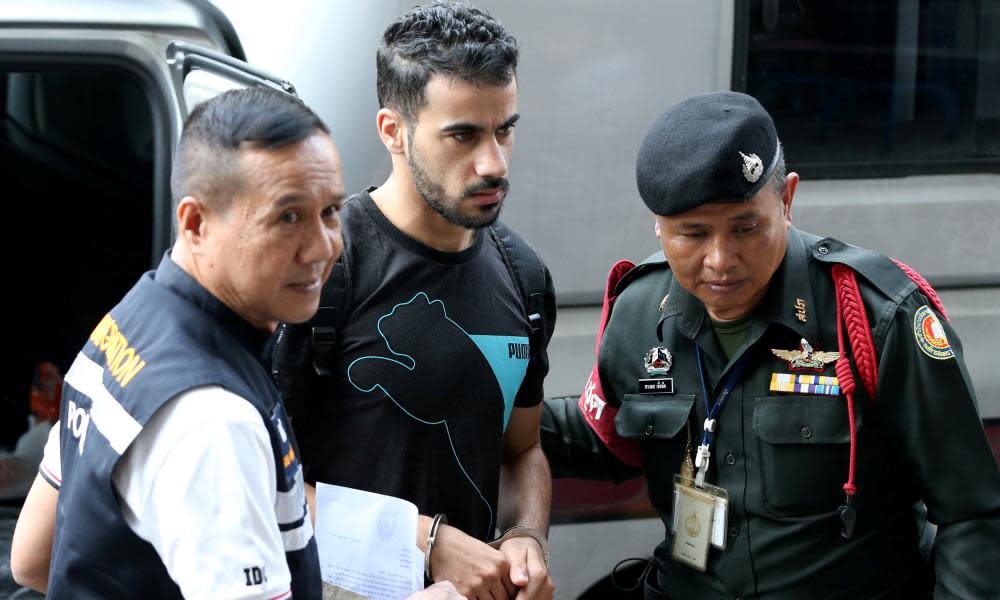Hakeem al-Araibi: calls grow for inquiry into police role in refugee footballer's arrest

Photograph: Athit Perawongmetha/Reuters
A parliamentary inquiry should examine the actions of the Australian federal police which led to the arrest of Hakeem al-Araibi in Thailand, Australia’s peak union body and the Greens have said.
Al-Araibi, a 25-year-old Bahraini refugee who has permanent residency in Australia, was arrested on arrival in Bangkok for a holiday, on the basis of an Interpol red notice, which was later lifted.
He has been in detention in Bangkok for almost two months, while Thai authorities process an extradition request from Bahrain.
Australia’s peak workers group, the Australian Council of Trade Unions, has called for a formal inquiry into the AFP’s processes and the role of Australian authorities in the lead up to his arrest.
Key questions about the complicated case remain unanswered, including the actions of the AFP and its officers seconded to the country’s Interpol bureau, which alerted Thailand to Al-Araibi’s travel plans because of the red notice against him.
The red notice was erroneously issued by Interpol against its own protocols which ban the granting of red notices for refugees on behalf of the country from which the individual fled.
“It’s deeply disturbing that our own authorities would help a country to extradite an Australian resident when they are accused of torturing that person,” said the ACTU president, Michele O’Neil.
“We are… calling for a parliamentary inquiry into the circumstances around his detention, and the role Australian authorities played in this awful situation.
“It’s not acceptable for Australian government authorities to help repressive regimes get their hands on people they wish to torture and unfairly detain, and we need to make sure it never happens again.”
Guardian Australia has been told the process by which the AFP alerted Thailand to Al-Araibi’s travel was largely automatic, however the details of that process are unclear, as is the reason Al-Araibi’s refugee status went unnoticed or unnoted during the granting of the red notice.
The AFP has previously said membership of Interpol creates “certain obligations” for member countries, that the red notice was not put in place by Australia, and that Thailand would have otherwise become aware of the red notice at the point of Al-Araibi’s arrival.
Interpol has repeatedly refused to answer questions about why it granted Bahrain’s request for a red notice, which was issued on the same day Al-Araibi received his visa for Thailand. It also is unclear how Bahrain knew Al-Araibi was intending to travel.
Greens senator Nick McKim said his party would work collaboratively with Labor and crossbenchers to establish and conduct the ACTU’s proposed inquiry.
“The handling of Hakeem’s case by Australian authorities certainly warrants the scrutiny of the Senate,” McKim told Guardian Australia.
“Hakeem’s life and liberty are at serious risk, and we need to get to the bottom of how this terrible situation came to pass.”
Mark Dreyfus, the acting shadow minister for justice, would not comment specifically on whether Labor supported an inquiry, but said the opposition party was concerned about Al-Araibi and had joined calls for his release.
“We are focused on supporting the government’s efforts to secure his return to Australia,” Dreyfus said.
“We have requested a briefing from the Home Affairs department regarding the Interpol notice to ensure that proper processes were followed.”
The Home Affairs department and its minister, Peter Dutton, were contacted for comment but neither responded.
The foreign affairs department and its minister, Marise Payne, has repeatedly lobbied Thailand and Bahrain, privately and publicly, for Al-Araibi’s release, including in a ministerial visit to Thailand earlier this month.
“The Thai government is well aware, at all levels, of the importance of this matter to Australia,” a spokesman for Payne said.
“The Australian government is making extensive efforts to seek his safe return to Australia, and will continue to advocate for this,” he said.
“Embassy staff continue to make regular consular visits to Mr Al-Araibi at the Bangkok remand prison and are in regular contact with prison authorities about his welfare. We note that there are legal proceedings underway in relation to Mr Al-Araibi and Australia will continue to be in close contact with Mr Al-Araibi’s lawyer and Thai authorities in relation to the case.”
The spokesman did not respond to specific questions about the parliamentary inquiry.

 Yahoo News
Yahoo News 
